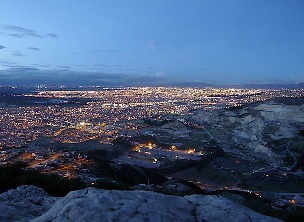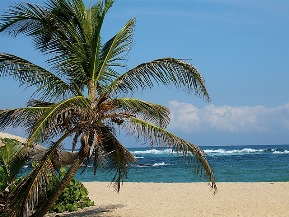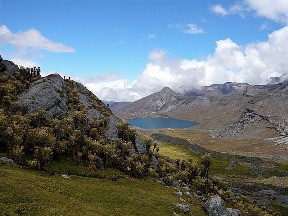Voices from Abroad: Gabriele Erba
Bogotà (Colombia), Exchange Program, Los Andes University
 Bogotà's sky and city lights |
An Exchange of Unforgettable Wonders
Each arrival naturally involves an amount of enthusiasm proportional to the length of the journey and that of the future stay. My first steps in a new country are always impressive, they come with that feeling of childish wonder that makes me open my eyes wide, surprised by the new and different routine. Colombia is probably the world's best spot to experience the paradoxes of Latin America. From the first moment until the last, they struck me like an unexpected earthquake. Seeing opposites live together was not a surprise, but discovering the way it happens there perplexed me.
Bogotà is split between north and south, between those who have more, and those who have less or nothing. I chose to live in the middle, in the historic center. It enchanted me with its winding streets, low and colorful houses, the myriad of restaurants and the mountains unto which it is thrust upon. The clouds racing low right above people's heads made me want to try and catch them, while the deep blue sky stamped a smile on my face every time I looked up and I fully breathed in the thin air of the Colombian plateau.
 Serene beach scene in Colombia |
The University (Universidad de Los Andes) where I studied, is huge and incredibly well equipped, founded sixty years ago, it has a campus full of history and anecdotes. The buildings are full of students, there are various faculties, which were, before becoming temples of wisdom, common breweries and candles factories, psychiatric hospitals and prisons. I very much enjoyed listening to stories of ghosts roaming at night around campus. The courses were interesting and quite difficult. I said farewell to the good life until the month before the final exam. Most of my classes took place amid suits and military uniforms in the MBA program. The price to pay for the exceptional life on exchange was to study for every lecture in advance, as the professor would never forget to test you and include each of your answers in the 5% of the final grade. At least teachers always reserved a big welcoming smile to foreign students.
To me, the most interesting course among those that I followed was called "Cooperation and Competition," taught by a professor who enchants, a dreamer who since the Nineties has been researching trust and other pro social economic behaviors. We used a lot of game theory, and we performed a different experiment during each class. In the first class the professor gave us $ 6 each and divided us into two groups, players 1 and 2. The player 1s decided how much they wanted to give to the 2s, knowing that the given amount would be multiplied by three. So, if those who played first donated $ 3, the second ones would receive $ 9 ... and so on and so forth. Obviously, player 2 could then decide how much to give back to player 1. I had always believed that eventually those more trusting of others, i.e. those giving higher amounts of money, would get back significantly more than the skeptics. That is why I gave all my $ 6 when playing first, and gave back $ 9 as player 2. The interesting thing is that this game, as all the subsequent ones, were made with real money, which could be spent in the classroom during sweets auctions, or converted in cash at the end of the course. This game attempts to model what happens when people trust each other: the economy moves faster and everybody gains from this. The results are more than encouraging. As Smith said, evolution has gifted us with a natural tendency to put ourselves in others' shoes. Traditional economics based only on egoistic drivers missed too many facets of human nature.
Anyway, to avoid boring you with my academic joys, I shall proceed with my exchanged daily routine. At noon, I would rehearse with the University's theater group, as we were preparing to perform a play by Dario Fo: Accidental Death of an Anarchist. I was glad that a page of our history which, unfortunately, is almost forgotten back home, here is so highly regarded.
After that, usually what followed was a fairly good, and fairly cheap lunch with friends somewhere around campus; a typical menu included Ajaco soup and a main course drowned in beans, rice, meat and a good fried banana. Enough calories to justify a real war against the inadmissible nap, interrupted every single time by the professor's blurry questions.
The days on exchange pass by quickly for all the exiting news, meetings and activities that naturally come with them. The weekends escape even faster, between dancing and singing cities, flower festivals and salsa nights, especially in Bogotà. Each place was worth a visit and a profound reflection, given the openness of the Colombian people.
 Foothills of the Sierra Nevada del Cocuy |
We must also say that no matter how beautiful colonial towns are, too much effort would be needed to make them compete with the richness and character of European capitals. On the other hand, over there, the unbeatable queen of all beauties was nature. Majestic open spaces, valleys which lost themselves beyond the horizon, enjoying gorgeous decorations by incredibly diverse and curious ecosystems. Colombia's (unjustified) terrible reputation, ended up being an asset, as the rarity of meeting a tourist made you feel like you were the first one to discover such wonders.
For instance, the last of these precious places that I had the honor to visit was the Sierra Nevada del Cocuy: a thirty km long cordillera that makes up the largest available mass of snow in Colombia. With some friends, between one peak and the next, we hiked around all of them, enjoying their sublime beauty and the clean, untouched nature. We were astonished to walk for days without meeting a soul, until we returned to society. One impressive thing at these latitudes is the Paramo ecosystem. It develops between three and five thousand meters above sea level giving birth to the strangest plants which invent a thousand and one ways to live through such a stressing temperature gap.
Similar to the Colombian people, they demonstrate an extraordinary creativity to proliferate and make a great living out of a natural, social and political environment among the most complicated in the world, and which therefore becomes one of the most fascinating and attracting too. All this, thanks to the Exchange program!